As the United States faces uncertainty over the future of its federal climate policies, a growing coalition of state and local leaders is stepping up to ensure progress on climate action continues. More than 100 U.S. mayors, governors, and local officials will be attending the upcoming COP30 climate talks in Brazil, representing the coalition known as America Is All In. Their participation in the global talks underscores a critical point: while the federal government may be retreating on its commitments to combat climate change, local and state governments are committed to pushing forward with aggressive action to reduce greenhouse gas emissions.
This coalition is a testament to the power of sub-national leadership in addressing one of the most pressing challenges of our time. As the federal government signals the potential rollbacks of critical climate rules, these local leaders are not waiting for Washington, D.C., to act. Instead, they are taking matters into their own hands, implementing policies and initiatives aimed at reducing emissions, fostering clean energy solutions, and preparing communities for the inevitable impacts of climate change.
One of the most outspoken advocates for this kind of action is Gina McCarthy, the former head of the Environmental Protection Agency (EPA) and a leading voice within the America Is All In coalition. In a recent statement, McCarthy urged local jurisdictions across the country to remain steadfast in their climate efforts, despite the challenges posed by the federal government’s stance. “We will not allow our country to become numb or debilitated by those who are standing in the way of progress,” McCarthy declared, emphasizing that the work being done at the state and local levels is not just important—it is essential for the U.S. to meet its climate goals.
Read Also: https://bizweekly.com/ai-powers-the-paris-agreement-a-groundbreaking-approach-to-climate-action/
The coalition’s leadership is particularly important given the current political environment. While climate change is one of the most urgent issues facing the planet, the federal government’s stance on climate regulations has fluctuated in recent years, leaving states and cities to pick up the slack. In response, many local leaders have taken it upon themselves to institute ambitious climate policies. These include renewable energy investments, carbon reduction strategies, and sustainable development practices that contribute not only to environmental health but also to economic growth through green jobs and clean energy innovation.
A new study released by the coalition in partnership with the University of Maryland Center for Global Sustainability highlights the potential of these state and local efforts. The study estimates that if states and cities across the U.S. continue to pursue ambitious climate policies—and if the federal government renews its commitment after 2028—the country could reduce its emissions by as much as 56% below 2005 levels by 2035. This level of reduction would significantly contribute to the global fight against climate change, potentially limiting the worst impacts of global warming and helping to meet international climate goals.
This new data further bolsters the argument that localized climate actions can have a profound impact on national emissions, even without strong federal policies in place. The findings are also a reminder that climate leadership does not begin and end in Washington, D.C. The ability for states and cities to implement meaningful, wide-reaching climate policies demonstrates the critical role that local governments play in shaping a sustainable future.
In the face of uncertainty at the federal level, local and state leaders are proving that it is possible to take decisive, impactful action. Cities such as New York, Los Angeles, and Chicago are already spearheading initiatives to reduce carbon emissions, enhance green infrastructure, and prepare communities for climate resilience. These local successes are not just policy victories—they are proof that a collective, grassroots approach to climate action can drive real change.
The participation of these leaders at COP30, the upcoming climate summit in Brazil, signals a clear message: despite the challenges posed by federal inaction or setbacks, the momentum for climate action in the U.S. will continue. It is a rallying cry for collaboration and an acknowledgment that, in many ways, the future of the planet’s climate depends on the efforts being made by those at the local and state levels.
As the climate crisis continues to escalate, the actions of these local leaders are a powerful reminder that the fight against climate change is not confined to the halls of Congress or the White House. It is a movement that is driven by communities, mayors, governors, and other local officials who are determined to ensure a sustainable future for all. Through their continued efforts, the U.S. may yet meet its climate goals—one city, one state, and one leader at a time.

